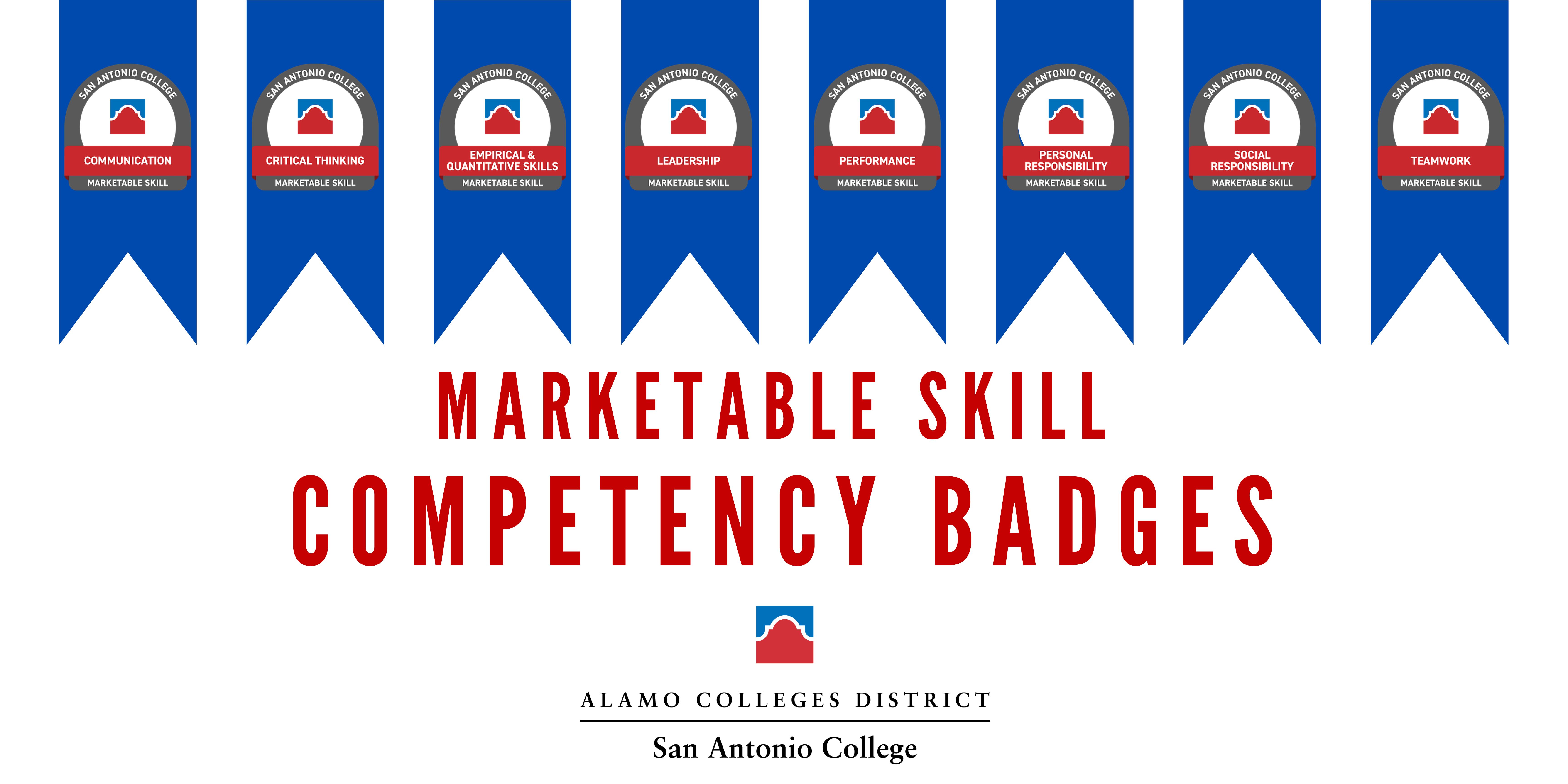Marketable Skills

Marketable Skills Week
Download Marketable Skills Flyer
A student, through coursework at San Antonio College and attainment of a degree, will obtain the following marketable skills:
COMMUNICATION: A student will effectively convey and understand information verbally, in writing, and/or visually.
- Written: Students will individually or collaboratively develop coherent, evidence-based, organized, grammatically correct writing using standard American English (or other language as appropriate), to include credible and relevant sources that appropriately borrow and reference information according to documentation style guidelines where applicable.
- Oral: Students will individually or collaboratively demonstrate appropriate speaking techniques based upon delivery of verbal and nonverbal elements, to include pitch, volume, variety, fluency, rate, pronunciation, articulation, vocal pauses, eye contact, gestures, movement, vitality, facial expression, or visual aids.
- Visual: Students will individually or collaboratively demonstrate visual communication through formal, conceptual, linguistic, or technical processes to include major movements, periods, artists, stylistic characteristics, works of art, or completion of creative works
CRITICAL THINKING: A student will explore, identify, analyze, and evaluate issues, documents, and circumstances before reaching a conclusion.
- Analysis: Students will identify, classify or challenge components of an argument/problem.
- Synthesis: Students will combine and organize evidence to demonstrate a greater depth of understanding of an argument/problem.
- Evaluation: Students will judge components of an argument/problem according to applicable criteria.
- Creativity: Students will develop original work through reflection and inquiry.
- Problem-Solving: Students will analyze appropriate evidence within an argument/problem, design and implement logical solutions, or measure the effectiveness of the solutions.
EMPIRICAL AND QUANTITATIVE SKILLS: A student will generate, frame, and analyze data to make informed conclusions.
- Data Analysis: Students will interpret data and analyze it in an appropriate context (e.g. business intelligence, statistical analysis, financial analysis, scientific analysis, medical analysis, historical analysis, public policy review, etc.)
- Lab/Clinical Technique: Students will observe proper laboratory or clinical techniques and follow appropriate laboratory and clinical safety protocols.
- Real World Application: Students will apply empirical or quantitative skills to address practical problems through experiential learning, simulations, business cooperatives, internships, game theory, artificial intelligence, computer programming, cybersecurity, or other relevant applications.
- Scientific Method: Students will identify STEM-related questions, develop a testable hypothesis, and apply the Scientific Method to validate or refute the hypothesis.
- Quantitative Methods: Students will demonstrate knowledge of quantitative methods through the manipulation of appropriate arithmetic, algebraic, geometric, trigonometric, probabilistic, or other relevant mathematical operations.
- Technical Presentation: Students will present empirical and quantitative results and conclusions in a variety of formats, to include (but not limited to) tables, charts, graphs, maps, or equations.
TEAMWORK: A student will be a flexible and resourceful team member who looks at different points of view and works with others to support a shared purpose or goal.
- Task Management: Students will manage a group task, such as identifying individual and collective responsibilities, developing a task schedule, periodically evaluating progress, rebalancing workloads and individual contributions as needed, or assessing the final outcomes.
- Individual Contribution: Students will contribute individually to a team task, to include outlining the project scope, developing a project schedule, periodically evaluating progress, or rebalancing workloads.
- Cooperation: Students will collaborate with others by integrating individual contributions into a team task to achieve a successful outcome.
PERSONAL RESPONSIBILITY: A student will connect personal choices, actions and consequences, with a commitment to excellence and success.
- Self-Awareness: Students will articulate their own core beliefs and describe their source.
- Ethics: Students will examine and assess various codes of ethics in light of their personal choices.
- Ethical Decision Making: Students will examine ethical dilemmas in the past or present in order to appraise choices, actions, and consequences.
SOCIAL RESPONSIBILITY: A student will build rapport and establish competence within diverse multicultural settings.
- Historical Perspective: Students will analyze events, processes, and other factors that have shaped present society.
- Civic Responsibility: Students will identify the foundations of the American political system and the roles and influences of individuals and groups in shaping American democracy.
- Global Engagement: Students will determine the factors that contribute to patterns of interaction among societies in the past and present and evaluate the impact of that interaction.
- Intercultural competency: Students will recognize the interaction of multiple cultural perspectives that exist in diverse communities.
- Social Justice: Students will examine how societies deal or have dealt with issues of impartiality, equity, and ethics
- Environment: Students will identify the deep interrelationships between human activity and the environment and the need to practice proper stewardship of the environment and the resources it provides
PERFORMANCE: A student will create artistic or technical demonstrations through the means of self-expression, language, technology, and/or learned skills.
- Artistic: Students will demonstrate creativity through observation, exploration, or production.
- Technical: Students will show progress through specialized training, by seeking advice from experts, by observing others, or through production.
- Linguistic: Students will demonstrate fluency in language by communicating with others through reading, writing, and speaking.
- Kinesthetic: Students will show their progress in skill development through formal or informal demonstrations.
LEADERSHIP: A student will maintain a productive work environment and confidently motivate others to meet high performance standards.
- Vision: Students will craft a vision for their group or organization and develop a strategic plan to achieve that vision
- Action: Students will identify goals toward the development of shared knowledge among faculty or peers to accomplish a variety of tasks or objectives.
- Service: Students will seek input from diverse viewpoints, critically evaluate all opinions, or clearly explain the rationale behind group/task decision making.
- Protocol: Students will recognize the value of following proper protocols